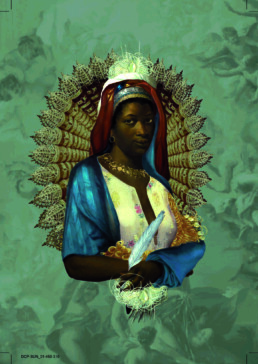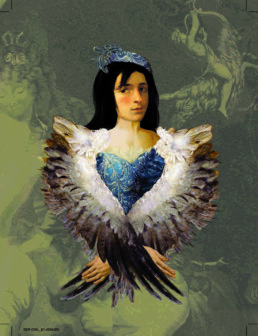Decolonial Portraits: digital collages restoring classical paintings of unknown people. Had common people been the protagonists of history? Not for the interests of the rulers and those who represented their world views. From European Reinassance to Neoclassicism, visual arts rarely portrayed those who were not in power.
Any detail in a portrait conveys meaning. This collection is about modifying elements in order to give imagined identities to those made negligible. By extracting objects, tools, clothes and accessories and pasting them in portraits of underepresented subjects, we aim to comment and counter the influence of western visuality.
Making sense of Mirzoeff, we consider visuality the twin of textuality, this one a system for convincing via the gaze.
Portrait of Fluidity and Portrait of Wisdom are the starters of this collection. Portrait of Wisdom originates in Portrait d’une négresse from Marie-Guillemine de Laville-Leroux. Painted in 1800, six years after the abolition of slavery in France. It was considered a manifest for women and black people emancipation, although it depicted a servant half naked. Louis XVIII acquired the original. We imagine it was most probably hanged on his chambers. Nowadays, this painting of an unknown woman is hanging at the Louvre Museum in France, hundreds of visitors look at her breast every day. How would she feel if she was to know the fate of her portrait? Mixing elements from eight different artworks we have clothed her and transformed her appearance into the portrait of an emancipated woman. A delicate dress, the silky wrap, the necklace and the feather transform her housemaid condition into that of a writer. Through oceans of time and wisdom, she questions who and why wrote history?
Portrait of Fluidity: a man blushing, with a delicate look, without name: Eustache Le Sueur’s Portrait of a young man (c.1640). Our “restoration” serves the question of what would be the quality of human relations if we weren’t normative, gender based, human centered. Following the special characters on Octavia Butler’s science fiction novels, we have mixed elements from five different artworks to recreate gender fluidity. A set of wings from Gustave Moureau, a refined dress from Ivan Petrovich Argunov, and hands from Dieric Bouts challenge gender normativity and anthropocentrism, a fascinating possibility. With this collage we draw attention to the changes in identity or expression of those who didn’t/ don’t fit into strict cultural categories of female or male giving them a special power.
The decolonial portraits are joyfully made with the help of Affinnity Photo. Printed in a limited edition of 51 copies, framed and carefully crafted at our studio. Each copy is different due to the uniqueness of each vintage frame. They come with a wall label explaining their origin and purpose.

